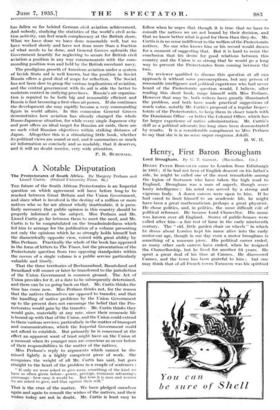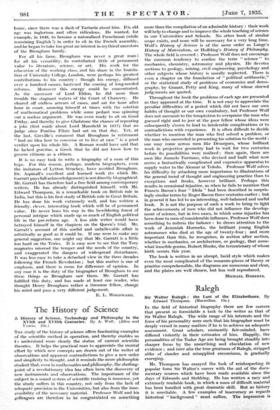Henry, First Baron Brougham
Lord Brougham. By G. T. Garratt. (Macmillan. 15s.)
HENRY PETER BROUGHAM eatne to London from Edinburgh in 1805; if he had not been of English descent on his father's side, he might be called one of the most remarkable among the legion of Scotsmen who have taken the high road to England. Brougham was a man of superb, though over- hasty intelligence ; his mind was served by a strong and vigorous body. A dozen careers were open to him. If he had cared to limit himself to an academic life, he might have been a great mathematician, perhaps a great physicist. He chose politics, and, in politics, the most difficult role of political reformer. He became Lord Chancellor. His name was known over all England. Scores of public-houses were called after him—a fair test of fame in the early nineteenth century. The "old, little garden chair on wheels" in which he drove about London kept his name alive into the early motor-car age, though in our day even a motor brougham is something of a museum piece. His political career ended, as many other such careers have ended, when he resigned the Chancellorship, but he lived for another 34 years. He spent a great deal of his time at Cannes. He discovered Cannes, and the town has been grateful to him ; but one may think that of all French towns Tarascon was his spiritual
home, since there was a dash of Tartarin about him. Ills old age was inglorious and often ridiculous. He wanted, for example, in 1848, to become a naturalized Frenchman (while remaining English !) in order to sit in the French assembly, and he began to take too great an interest in mythical ancestors of the Brougham family.
For all his fame, Brougham was never a great man ;
for all his versatility, he contributed little of permanent value to literature, science, or art. His work for the education of the working class, and his share in the founda- tion of University College, London, were perhaps his greatest contributions to his country : though his energy, diffused over a hundred causes, hastened the coming of long-needed reforms. Moreover this energy could be concentrated. As the successor of Lord Eldon, he did more than trouble the stagnant waters of the Court of Chancery. He cleared off endless arrears of cases, and sat for hour after hour in court, amusing himself at times with the solution of mathematical problems while some pedant was spinning out a useless argument. He was even ready to sit on Good Friday, and thereby to give Gladstone the chance of repeating a joke (first made about Lord Mansfield in 1817) that no judge since Pontius Pilate had sat on that day. Yet, at the last, Greville's comment that Brougham in retirement " had no idea how to converse or to live at ease" is a good verdict upon his whole life. A Roman would have said that he lacked graritas, a Greek that he did not know how to govern citizens as a citizen.
It is no easy task to write a biography of a man of this type. For this reason, perhaps, modern biographers, even the imitators of Lytton Strachey, have avoided Brougham. Dr. Aspinall's excellent and learned work (to which Mr. Garratt pays full acknowledgement) is not directly biographical. Mr. Garratt has therefore had a free field among contemporary writers. He has already distinguished himself, with Mr. Edward Thompson, in a remarkable book on British rule in India, but this is his first study of British rule in Great Britain. He has done his work extremely well, and has written a friendly, clever, interesting book which will be of permanent value. He never loses his way in the bewildering forest of personal intrigue which made up so much of English political life in the pre-reform age. A less able writer would have betrayed himself in the chapters on the Queen's trial. Mr. Garratt's account of this sordid and unbelievable affair is artistically as good as it could be. If one were to make any general suggestion, one might say that Mr. Garratt is a little too hard on the Tories. It is easy now to see that the Tory magnates misread the temper and the needs of the country, and exaggerated the dangers of widespread disturbance. It was less easy to take a detached view in the three decades following the French Revolution ; but this matter is one of emphasis, and there is room for difference of opinion. In any case it is the duty of the biographer of Brougham to see these things as Brougham saw them. Mr. Garratt has fulfilled this duty, and has made at least one reader, who thought Henry Brougham rather a tiresome fellow, change his mind and pass a very different judgement.
E. L. WOODWARD.











































 Previous page
Previous page